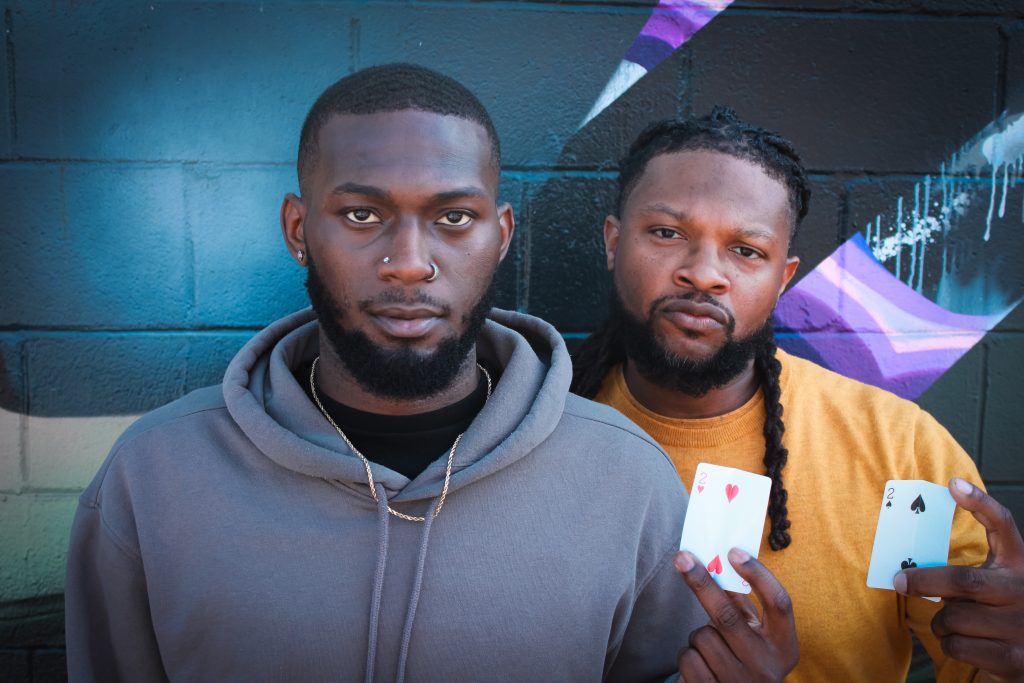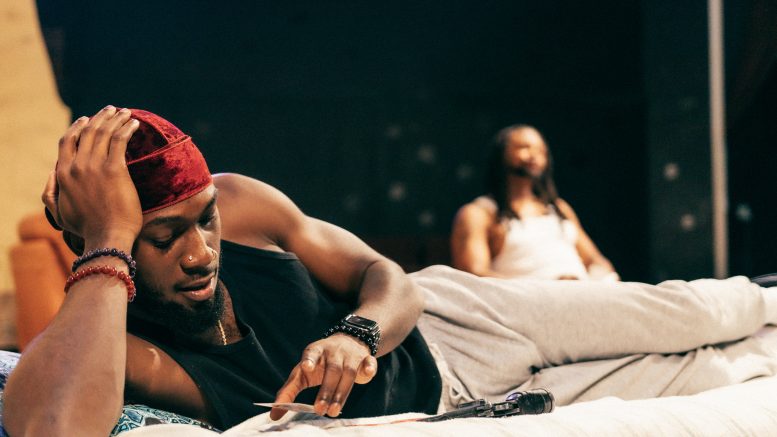By Dave Kempa
What makes the man?
Is it the clothes he wears? His sexual prowess, or capacity for violence? The amount of money he has, or the way he attains it?
Or is it his capacity for love and support?
Over two decades after playwright Suzan-Lori Parks’ “Topdog/Underdog” opened off Broadway to immediate acclaim, it is striking how her Pulitzer-winning drama — which the New York Times in 2018 called the best American play in 25 years — continues to capture and distill the here and now.
“Topdog/Underdog” is a two-man performance following the relationship between brothers Lincoln and Booth (named by their father after the former US president and his assassin “as a joke”), as they navigate poverty, family history, romantic relationships and the Black experience together in a seedy apartment they can scarcely afford.
Melinda Wilson Ramey, director of Sacramento’s Celebration Arts production of “Topdog/Underdog” — which runs until June 30 in its intimate 100-seat theater — first saw the play as a graduate student in New York City in 2002, where she happened to meet the playwright after the show. If Parks were to, in turn, find herself in California’s capital this month, I believe she’d enjoy how this grassroots community theater company handles the rich and roiling dialogue and brambly themes of her celebrated script.
Lincoln (played by Conrad Crump) is an Abraham Lincoln impersonator at a local arcade, where patrons pay countless times over the course of the day to reenact the former president’s assassination, “shooting” him in the back of the head with fake guns. His fiery younger brother Booth (played by Donald Lacy III) is a small-time thief wrestling with unemployment and the challenges of trying to win back an ex-girlfriend.
We meet Booth in his grungy single-room home as he practices his performance in three-card monte, a sleight-of-hand street game designed to separate unsuspecting passersby from their money. Lincoln quietly enters after a long day of work at the arcade, dressed in his whiteface presidential costume — nearly scaring his brother to death.
Homeless and barely scraping by, Lincoln has been sleeping on the recliner in his brother’s apartment since his ex-wife, Cookie, left him. And though Booth sometimes needles “Link” over his shortfalls in securing housing or pleasing women, he relies on his older sibling’s salary to pay the bills and fund his efforts to win back his own former love interest, Grace.

Crump and Lacy foster the chemistry and complications of brotherly love and rivalry with skill throughout the production, navigating repartee and movement through the cramped apartment with growing familiarity. The evolutions of both Lincoln (emasculated by his circumstances, but nurturing and stable) and Booth (desperate to prove his worth as a man) come together in a fitting and seemingly inexorable end.
Just as compelling as Crump and Lacy’s presence onstage is the absence of anyone else in their characters’ lives. Their parents abandoned them as children to fend for themselves, which explains their destitute lifestyle. Cookie is no longer in Lincoln’s life, and we come to find that Booth’s work to woo back Grace is proving fruitless. In one scene where she has stood him up for dinner, his big brother offers a careful word of support before stepping back.
“You look sad.”
“Nope. I’m just, you know, I’m just —” replies Booth.
“Cool,” says Lincoln.
“Topdog/Underdog” debuted three years before bell hooks published “The Will to Change: Men, Masculinity, and Love,” the groundbreaking work that introduced clear and new language to how white supremacist, capitalist patriarchy breeds isolation in our men, how anger is the only accepted emotion for the American male to express, and how violent behavior in men is so often rewarded. Parks conveys these ideas so viscerally and tragically in this play that it feels as if she got her hands on an early manuscript of hooks’ book.
“In patriarchal culture males are not allowed simply to be who they are and to glory in their unique identity,” writes hooks. “Their value is always determined by what they do. In an anti-patriarchal culture males do not have to prove their value and worth. They know from birth that simply being gives them value, the right to be cherished and loved.”
In Celebration Arts’ production of “Topdog/Underdog,” that love is clear as day, but the brothers’ ability to express it and accept it from one another is repeatedly put to the test as external and internal forces upon their sense of worth tear them apart.
Lincoln’s past as a talented three-card monte dealer tantalizes him as he suffers setbacks at work. For all his peacocking, Booth is increasingly frustrated by barriers to his efforts to improve his own status.
Theatergoers will not be disappointed by this wonderful community theater production of one of the modern era’s greatest American plays.
This story was funded by the City of Sacramento’s Arts and Creative Economy Journalism Grant to Solving Sacramento. Following our journalism code of ethics and protocols, the city had no editorial influence over this story and no city official reviewed this story before it was published. Our partners include California Groundbreakers, Capital Public Radio, Outword, Russian America Media, Sacramento Business Journal, Sacramento News & Review, Sacramento Observer and Univision 19.


Be the first to comment on "Sacramento theater review: ‘Topdog/Underdog’ a stunning exploration of being Black and male in an unforgiving USA"